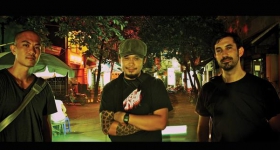On Wednesday, March 11, amidst increasingly concerning reports on the spread of COVID-19, I attended the Asian American Night performance of “Cambodian Rock Band” at the Signature Theatre in New York City — the last performance of the stage play before theaters across Manhattan went dark.
It seems strange to write about live theater now, in this time when nobody is certain when actors will be able to perform on stage or if the lights on Broadway will shine again. The memory of live theater feels like something from a different life. That I took so long to write this review (and to edit the conversation I had with writer Lauren Yee shortly after the show closed) is due to my own struggles with the effects of the pandemic — the anxiety of the subsequent months, yes, but also because that night conjures up everything that surrounded it. In the hours leading up to the performance, I fretted about whether or not it was safe to be in a small theater filled with people, ultimately telling myself maybe things in New York weren’t that bad. Still, I wore a mask throughout the entire show and assiduously doused myself in hand sanitizer during intermission. The next day, shows across the city were halted. The performance of Celine Song’s “Endlings” that I had tickets to that night was cancelled. By the weekend, schools were closed and the city was locking down. In the space of a few days, things were in full panic mode.
So it was in that small space of just before that I saw “Cambodian Rock Band,” not knowing it would be the last show I’d see in a long time, and that backdrop, at least in part, colored my response to it. (Spoiler alert: I loved it.)
The play, written by Lauren Yee and directed by Chay Yew, opens with a live band playing an upbeat, crowd-rousing song reminiscent of surf-rock acts of the late ’60s and early ’70s. The audience is pulled into what feels like innocent, joyous entertainment, only to have this turned on its head almost immediately as a charismatic master of ceremonies appears on stage and, after first cycling through some images of Cambodian bands from that time, projects devastating photographs from genocide at the hands of the Khmer Rouge. Soon after, we are introduced to Neary, a 20-something--year-old Cambodian American working in Cambodia for a justice-oriented NGO, and her father Chum. Neary is working to convict a former Khmer Rouge official for war crimes and is irritated by her father’s jokey attitude and refusal to take any interest in her work or anything to do with Cambodia. This present-tense acts as a frame for the meat of the play, which mostly takes place in the months before and years after Cambodia falls to Pol Pot. Raucous and affecting musical acts are interspersed between scenes, cover tunes of real Cambodian musicians who disappeared during the Khmer genocide and contemporary L.A.-based band, Dengue Fever (and performed expertly by the actors themselves).
The play carefully explores many themes — questions on the importance of art and music in the face of tragedy and violence; the ways in which trauma is often dealt with through silence and the chasm it can cause between generations; the importance and power of controlling one’s story — and does so with a balancing act of humor, tenderness, humanity and sincerity. The actors in the staging I saw — in particular, Joe Ngo, who played Chum (and is himself the child of Cambodian refugees), and Francis Jue, who played Duch — were tremendous in their range, charisma and talent, often acting dual roles while playing instruments to boot, bringing the complexity of the characters to life.
I am not Cambodian, though I am Asian American. In a different time, I would have commissioned a Cambodian American writer to attend the performance and write about their reaction. As it is, I can only bring my perspective as an Asian American. While I can’t speak to the particularity of being a Cambodian refugee or being descended from one, I can say that there is much in this play that resonates with my experience as a child of immigrants, where the specter of inherited trauma looms in one’s family history. Thus, the moments between father and daughter — which some white critics seemed not to like as much — particularly moved me.
There is one scene, for instance, that was so painful, it took my breath away. Neary is pushing her father to confront his past, and he deflects, making jokes and giving shallow reasons not to. You can feel the pain behind his joking, a quiet plea to let things be, but Neary doesn’t relent and he finally breaks. “You want to know how sad my life is?” he says. “My daughter thinks I was an only child? No. Seven. I had seven brothers and sisters growing up.”
Anyone who has grown up around the silence surrounding trauma will understand how truly heartbreaking this moment is, for both father and daughter. Father, for breaking his silence over what is clearly something he does not want to think about; daughter, for realizing that there has been so much pain her father has experienced that he has tried to spare her from.
I wonder if this moment, along with others, played better to the majority Asian American audience I sat with that night than it normally would have. They were receptive throughout, laughing at jokes, drawn in in the sober moments. Despite the makeup of the audience, I found it hard to entirely shake off white expectation. Sometimes I worried that the exaggerated humorousness of Chum’s father veered into caricature, that his inter-Asian racism reflected poorly upon Asians, that the brutal depiction of torture and imprisonment might scratch a white viewer’s itch for trauma porn. But later, it occurred to me that the reason I worried about this at all was because I’m so unused to Asian and Asian American stories being told on the American stage that I can’t help but worry about how things are viewed through the white lens.
The play, smartly, has headed off those who might be tempted to engage with Cambodian history from a place of pity by implicating the audience from the outset: “In case you were not aware, music is the soul of Cambodia,” says the narrator in the beginning of the show while showing photos of vibrant Cambodian musical acts, “But that's not what you think of when you think of Cambodia, is it? YOU think of something a little more like this.” The narrator then switches to grislier, yet arguably more familiar photos of Cambodian genocide, directly calling us out by confirming the stereotyped Cambodia many Americans probably hold in their minds. As for Chum’s hammy persona? When I put aside my fears of what a white gaze might see, I felt a recognition of certain men in my own family in the complexity of his personality, even down to his inter-Asian racism, something you learn later is also rooted in a trauma he has endured.
But the true hard-hitting moment of the play came for me not because of race but because of the moment I was — we all were — living in. At the end of Act One, as the Khmer Rouge rolls in to take over Cambodia, members of a band, with no chance to flee, turn to music. The music is loud, defiant, as the vocalists repeat over and over, “It weighs a ton on me,” and sinister red lighting and the sound of artillery fire fades in. There’s a sense of foreboding, that nobody on stage knows what is going to happen next.
Of course, a pandemic is very different from a suppressive dictatorship and genocide, and it would be ignorant to set those on par. But I can’t deny that in that moment, as the lights came on at the end of Act One, I was left with a feeling of dread, that we were on the brink of something we didn’t understand the implications of yet. I felt the way the characters must have — unnerved, worried about the future, wondering if this was a key moment in history that would change our worlds forever. But I also found myself thinking that, no matter what happened next, as one character says, “There will always be music.” The same could be said of theater. Many months later, I still think about this play, and I wonder about its next incarnation, hopeful it will have the opportunity to touch many more people. That’s the immortal power of art. These stories will always find a way to survive.
You can read a transcript of the interview with Lauren Yee here.
It has recently been announced that there will be a North American tour of the play in the 2021-2022 season. The cast album is available on Spotify and the book is available from Samuel French.










Comments